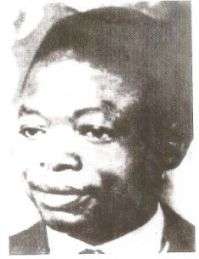Ruben Um Nyobé

Ruben Um Nyobé (1913 – 13 September 1958) was an anti-colonialist Cameroonian leader, slain by the French army on 13 September 1958, near his natal village of Boumnyebel, in the department of Nyong-et-Kellé in the maquis Bassa. He created on 10 April 1948 the Cameroon's People Union (UPC), which used armed struggle to obtain independence from French colonial rule. After his death, he was replaced by Félix-Roland Moumié, who was assassinated by a former agent of the SDECE (French secret service) probably at the request of Cameroonian authorities with thallium in Geneva in 1960.
Early childhood
Um Nyobé, known as the forgotten father of Cameroon, was born in 1913 in Song Mpeck, Kamerun, what is now known as modern-day Cameroon. An intelligent African politician to have emerged after the Second World War with the sole purpose to fully liberate the country of Kamerun from French rule. Um Nyobé was not just an ordinary child. He came from a family in Bassa where Agriculture was the main production in the village. His father, however, was not just a farmer. he was a traditional priest in their village, where they practiced animism as a form of religion. Um Nyobé, however, was deemed Christian by many who knew him. He only acquired his Christian name Reuben after he was baptized but prior to that, he was known as Um Nyobé. He was baptized as a Christian and attended a Catholic Christian school. He was intelligent and very knowledgeable on the impacts of the French occupation in Cameroon due to his bold stance for independence and opposition to the French in Cameroon. At the age of 26, he achieved his baccalaureate degree at a university in Edae. Shortly after his degree, he married his wife, Martha, in 1944 after university and stayed in the city of Edea and continued studies in law, as it was his sole passion.
Known as the Enigmatic Sphinx of Africa by the Europeans, Um Nyobé was initiated into the CGT union that fought against the partition on Cameroon into the Anglophone and the Francophone region in 1947, along the same period of the Partition of India and the end of the Indian Raj. Due to this fort resistance is seen around the world and particularly in Asia, Um Nyobé and the member of the Union began spreading the words of independence and denounced the Catholic religion that justified and advocated for colonization and slavery. His efforts managed to unite diverse ethnic groups to join the resistance against the French. He was named" Mpodol Ion", which meant speaker of the nation or spokesman in the native language of the people of Bassa. His friends called him Mpodol, which meant "prophet", due to the belief that it was his biblical mandate to lead and speak as their prophet.[1]
He presented multiple forays in the united nation both in 1952 and in 1954 speaking on behalf of the people of Cameroon and other colonized African countries. He expressed his view of independence as an appeal to the natives of the country and must be the same vision for the rest of the World. As leader of the UPC, he made many gestures of integrity where he refused to negotiate with the French. His adamant character made him fearful by most of the French diplomats. In the struggle for Independence and the violence that surrounded it, Um Nyobé and members of the UPC fled underground. They were hunted by the French and decapitated one by one. Um Nyobé was brutally killed in his home along with his mother in law. Until this day, he is remembered as the Forgotten Founding Father of Cameroon by the International community. As a portrayal of loyalty by his people to him, a statue was the forgotten Hero in Eseka.[2]
References
- ↑ Kinni, Fongot Kini-Yen. Pan-Africanism: political philosophy and socio -Economic anthropology for African liberation ... and governance. Vol. 3, Langaa Rpcig, 2015.
- ↑ African Nationalism in Cold War Politics: 1952-1954, Cameroons' Um Nyobe Presents the UPC Program for Authentic Independence at The United Nations
- Joseph, Richard A. (October 1974). "'Ruben Um Nyobe' and the 'Kamerun' Rebellion". African Affairs. 73 (293).
- Joseph, Richard A. (Summer 1975). "National Politics in Postwar Cameroun: The Difficult Birth of the UPC". Journal of African Studies. 2 (2).
- Joseph, Richard A. (1977). Radical Nationalism in Cameroun: Social Origins of the U.P.C. Rebellion. Oxford: Clarendon Press.
- Mbembe, Joseph-Achille (1989). Rubem Um Nyobe: Ecrits sous maquis. Paris: L'Harmattan. ISBN 2858029229.
External links
![]()